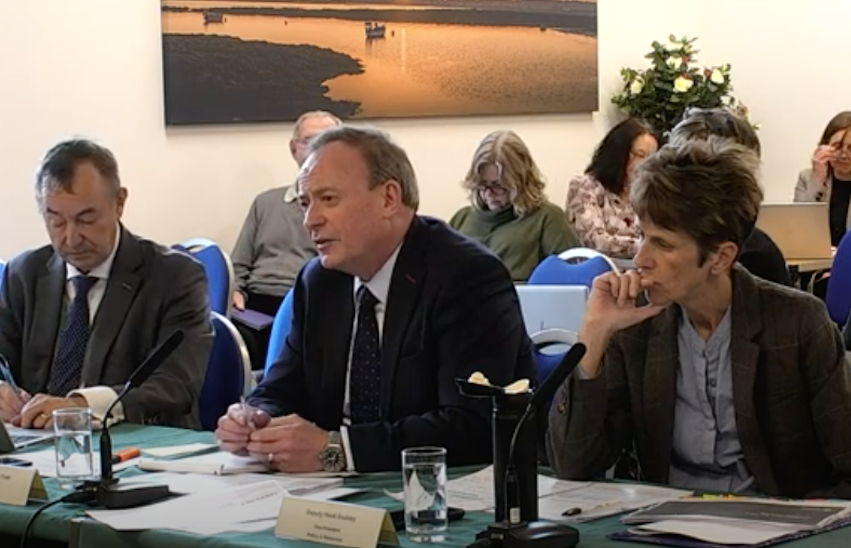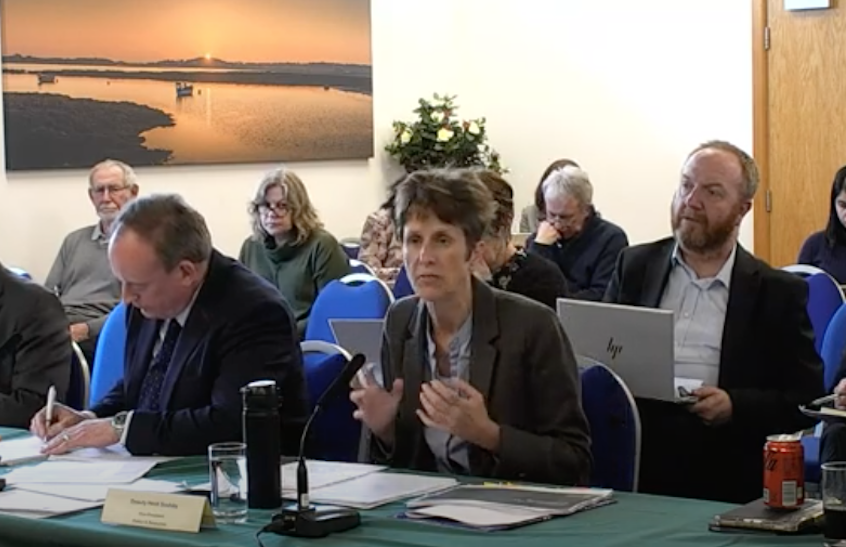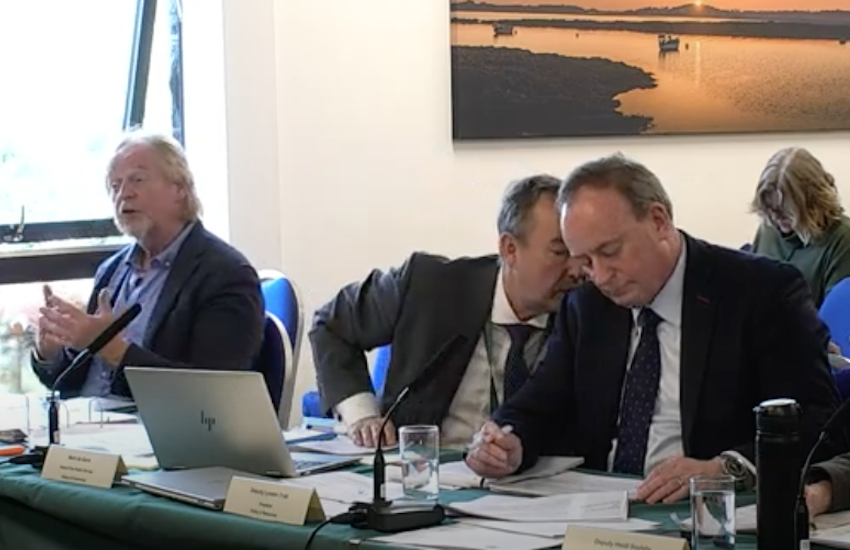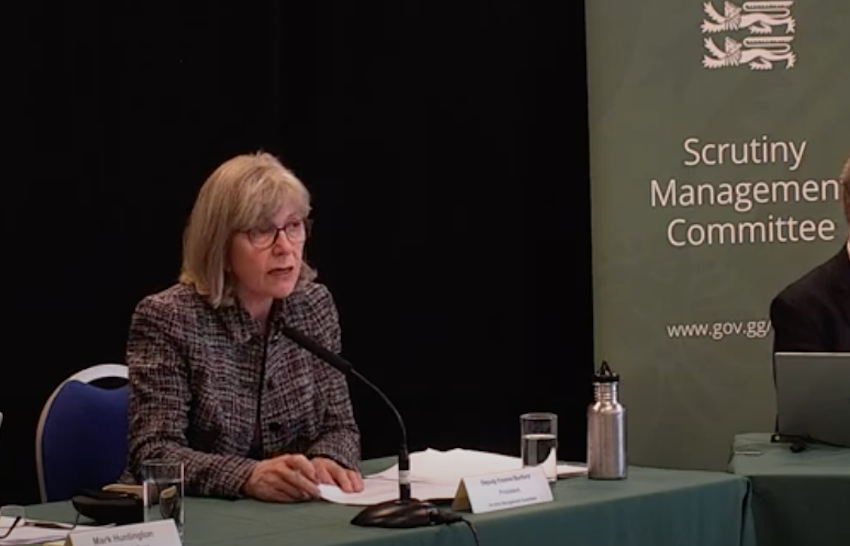


Major policy disagreements and stalled progress at the heart of government over addressing inefficiencies in how it works, funding for care homes, and reforming health have been exposed by the latest Scrutiny hearing.
Members of Policy and Resources were quizzed on topics that also included the housing crisis and the lacklustre performance of States investments.
It was P&R’s first time before the panel since Deputy Lyndon Trott was elected as the committee’s president and Deputies Heidi Soulsby and John Gollop took up their posts.
In 2017 the States agreed a 10 year programme to transform health and care known as the Partnership of Purpose.
There were predictions that real terms spending on health and care would increase from £193m. to £214m. by 2027 if nothing changed.
Pushed on whether spending by Health was out of control, Deputy Soulsby, who led HSC at the time the programme was agreed, said the States had “fallen behind” on those planned reforms.
She was pushed on why that had happened, during yesterday's Scrutiny hearing.

Pictured: Deputy Heidi Soulsby.
After remarking on the impact of Covid, she said: “I’ve been the standard bearer for the new model and I don’t know whether that things fell away a bit when we didn’t have the committee that was behind it pushing it forward, staff were taken away from that committee which meant they didn't get the support that they needed to actually put forward a sustainable health model.”
“All government support” was needed of HSC and what their issues were, she said.
There was a £3.9m revenue overspend by the committee last year, 1.8% of its budget.
Deputy Soulsby said that not having a Chief Officer overseeing that committee has had an impact.
“I do think having that strategic head, who is there working for the committee at that time, it's really important.”
That point is part of the reshaping government review, work on which begun in December 2021, but Deputy Soulsby said had “gone off on a tangent” about executive government.
“Actually it’s about working in tandem with the civil service structure.”
At the time it was started, the review was envisaged to largely revolve around public service transformation and how it was organised, the hearing heard.

Pictured: Deputy Bob Murray addressed the hearing while Head of the Public Service, Mark De Garis, and Policy & Resources President Deputy Lyndon Trott are in discussion.
The P&R sub-committee working on the review has seen a revolving door of political membership, with deputies Soulsby, Bob Murray and now John Gollop involved, while Deputy Jonathan Le Tocq has been a consistent presence.
A proposal is being readied for the States.
“It would be fair to say I think that it is not revolutionary and I think that was intentional, because by the time that all of the preparatory work had been done to look at what options we might have, and because there were some members that have come and gone and there clearly was dissent in that committee, without a doubt there were some polarised views, so you're looking really at the lowest common denominator that you can find agreement on to actually bring something back,” said Deputy Murray.
It is looking at a similar structure to previous States with a Policy Council type approach to strategy development where all the political heads of committees sit.
That would mean changes including the role of the Chief Minister and how Treasury works.
“We don't have a forum for strategy development, it comes from committees. And then obviously what you've got is a bunfight as to who gets priority as a consequence of that. That's not the way to do government. It can't be.”
P&R has limited powers in influencing that other than through financing, he said.
The proposed approach would explore commissioned areas like sport.
It could also look at reducing the number of States members, but not by a considerable amount.
Alderney representation is also being addressed.
“What we then recognised is that the public sector…need to reflect any changes in that and that still needed to be worked through.”

Pictured: Scrutiny President Deputy Yvonne Burford.
Scrutiny President Deputy Yvonne Burford said it seemed that what was envisaged to be about the public sector with a small focus on the political had reversed and become all about how many deputies there were, whether there was a Policy Council, and had there been a “mission creep”.
None of the proposals are likely to take effect by 2025, when the election takes place, the hearing heard.
Deputy Murray said it was “unlikely” that P&R would unanimously support something.
Head of the Public Service Mark De Garis was concerned that people were getting the wrong impression of the term of reference for the work, which he said was to look at the structure of government and then make sure that the civil service or the public service was shaped to support that decision.
“So it wasn't that the primary focus was on restructuring the civil service.”
It is expected the sub committee will bring a status report to P&R that proposed instigating a special investigation committee next time around with a focus on the machinery of government.
“So that sounds like it is, it's an attempt to kick the can down the road into the next Assembly,” said Deputy Trott.
“But the point that I think has been made is there have been a lack of resources, which has made it a challenge.”
Last year P&R and Employment & Social Security did a joint presentation to States members on proposals for the sustainability of long term care.
The policy was meant to be published at the end of this month.
Asked when they would be released, Deputy Trott said that he was not sure.
“There are differing views around the Policy and Resources Committee as to how this should be progressed, colleagues can speak for themselves, but there is a view that this should not be a matter that is addressed unilaterally, that it should be addressed as part of a suite of matters in order that the overall picture can be can be understood,” said Deputy Trott.
ESS wanted long term care funding dealt with separately.
Cost estimates suggest it could be an extra £35m. a year needed, which comes on top of the £100m. spoken about as part of the failed tax review.
Disagreements also rage about whether the cost of someone’s home should be brought into the calculations, or simply rely on contributions.
The debate will happen in September “at the earliest,” said Deputy Trott. But the committees may not be in agreement on the proposals, he admitted.
“There is a fundamental difference of opinion. I can't hide from that both in terms of what should be in scope, and indeed when the matter should be debated.
“Now, one of the arguments has been put forward is that the care homes need certainty and they need it. They need it quickly. Personally, I think that's a strong argument because funding models depend on policy direction in this particular environment. But it's also very easy to see how important it is to present the big picture.”
Whether the States could make any decision by the end of this term on the issue was “questionable,” Deputy Soulsby said.
Comments
Comments on this story express the views of the commentator only, not Bailiwick Publishing. We are unable to guarantee the accuracy of any of those comments.